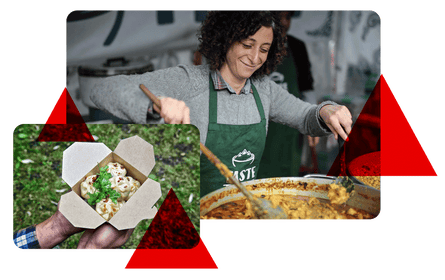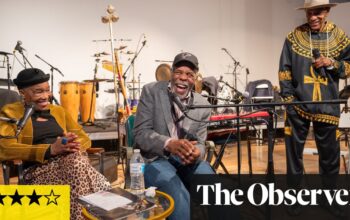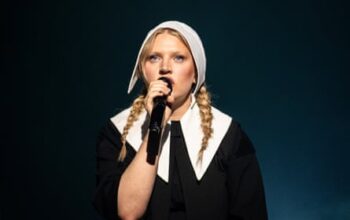A five-day event spread over more than 360 hectares at Worthy Farm in Somerset, the Glastonbury Festival takes a full year of planning, with about 3,000 staff and volunteers working behind the scenes to help make the festival a bucket-list event for 200,000 or more revellers.
Among the staff are almost 800 vendors selling everything from food and drink to upcycled clothing, handmade jewellery and art. Whether they’re busy building up stock and testing new products or making sure the payment network at the festival won’t let them down, these vendors spend weeks planning their crucial contribution to the Glastonbury experience.
Here, a food stall operator and an eco clothes seller share how they’re getting ready for the festival – and why strong connectivity is essential to their success …
‘We’ll handmake thousands of momos in the run-up to the festival’
Julie Kleeman, 49, and husband Yeshi Jampa, 45, own food stall Taste Tibet, and will be pitching up at the West Holts stage to serve hungry festival-goers their homemade curries and momos
“We ran a market and food stall for six years before opening our restaurant in Oxford in 2020, but decided to continue spending summers on the road attending festivals as traders. Yeshi grew up in Tibet and led a semi-nomadic existence there, so travelling and cooking outdoors is in his blood. He’s very much in tune with nature, and even notices things like how the local water makes his food taste, so going to festivals with our children isn’t something we want to give up.
“Preparing for the festival is an enormous job. Many traders travel from one festival to the next and have their ingredients delivered to them, but our menu includes handmade beef and vegan momo dumplings, which we have to prepare in advance.
“In the run-up to Glastonbury we’ll make thousands of momos, which is a massive operation. We’ve invested a huge amount in our kit, including a trailer that’s split into a freezer and fridge so we can keep our momos fresh. We heat them up in huge paella pans so they get lovely crispy bottoms, alongside vats of our chicken and vegan curries, which are made fresh on-site.
“Thanks to all that prep, our turnaround is really fast – once they’ve queued, customers receive their food immediately – which, for us, means that good connectivity for taking card payments is crucial. We take very little cash these days, and there’s nothing more stressful than having food ready on our side of the counter and hungry customers on the other, but no way for them to pay. We’re really pleased Vodafone will be at Glastonbury to ensure things will run smoothly.
“This will be our third year at the festival – and although it’s hard work it’s also so much fun. Traders arrive on the Sunday before the gates open, which means we get to enjoy the site for three days before customers arrive. It’s a special time – a different atmosphere that’s quite gentle, with great camaraderie between staff and volunteers.
“But once the general public are on site, it’s even better. Getting into the festival is like winning a golden ticket, so everyone’s excited to be there. Although the work is tiring, we often say that while we feed our customers, they’re also feeding us with their positivity and good vibes.”

‘Five years ago I’d retired – now I’m selling my upcycled clothes at Glastonbury’
Gillian Smellie, 60, launched Eco Print Textiles just two years ago – and this summer, she’ll be selling her sustainable clothing range at the festival
“I’ve always been interested in fashion and textiles, and during the pandemic I had the time to practise my eco-printing technique. It involves tightly bundling clothes up with leaves and boiling them for five or six hours, which allows the natural pigments to form wonderful patterns on the material.
“After lockdown ended, my daughter urged me to start selling them – but then a breast cancer diagnosis stopped me in my tracks. It was a devastating setback, but also gave me a chance to think about what I really wanted from my new business. I’ve always been passionate about sustainability – I was the one taking used carrier bags to the supermarket in the 80s – so I decided to start printing exclusively on preloved clothing made from natural fibres. My aim was to help change people’s perception of secondhand clothes, and to make them feel like a luxury.
“I also decided that once my customers were finished with a garment, for whatever reason, I’d take it back for repurposing or composting and give them a discount on a future purchase. In this way, my business would be as circular and eco-friendly as possible.
“In 2023, when I was back on my feet, I started taking Eco Print Textiles to craft fairs and small festivals, and I was both excited and terrified to hear I’d landed a stall at this year’s Glastonbury. I’ve never even attended as a festival-goer before, so it’s a dream come true.
“The first thing a vendor checks when we book a festival is connectivity, so I was relieved to hear that Vodafone will be providing an on-site payment network. My prices range from £30 to over £100, and nobody carries cash like that to a festival. It’s so frustrating to lose out on sales simply because you don’t have a good enough signal.
“I’m aiming to take 250 to 300 items to sell, which will range from a size six to a 24, and I’ve technically been prepping for the festival since winter, which is when I do a stock check. Then, come spring, new leaves start coming in, and I start printing every week to ensure I’ve got enough clothes to carry me through the busy season.
“If you’d told me five years ago that I’d be at Glastonbury with my own upcycled clothing business, I honestly would have laughed. It’s scary, but I’m definitely ready for the challenge.”
Connecting you to Glastonbury this summer
Vodafone is the official connectivity partner of Glastonbury Festival. To find out more and to download the official Glastonbury app, head to vodafone.co.uk
Source: theguardian.com


